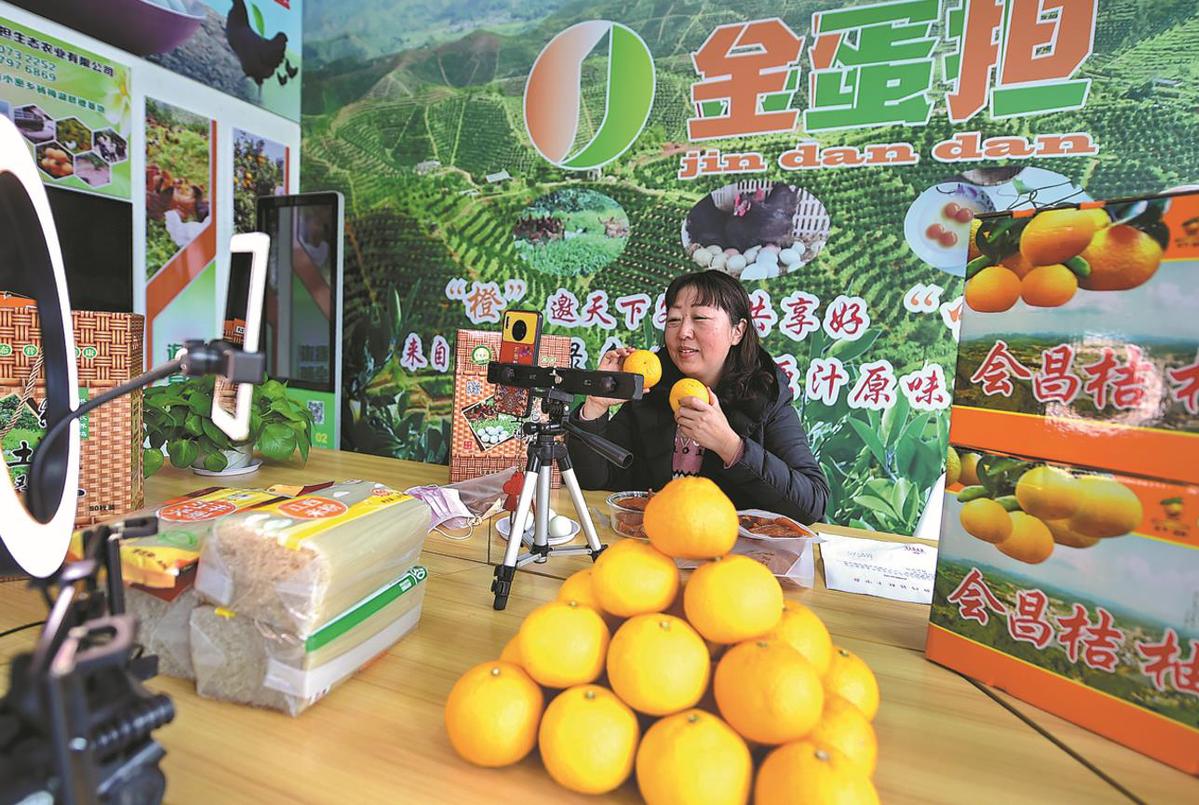Online sites come to farmers' aid
China Daily,March 09, 2020 Adjust font size:

A woman promotes tangelos, a hybrid citrus fruit, via livestreaming in Huichang, Jiangxi province, on Feb 5. [Photo by Zhu Haipeng/For China Daily]
Strategies such as promotions through livestreaming help sell surplus agricultural produce
The use of e-commerce sites for procuring household goods is something known to all across China. But for farmers staring at the prospect of seeing their agricultural produce becoming unmarketable following novel coronavirus outbreak, these sites are turning out to be white knights riding to their rescue.
Online shopping sites in the country have lent a helping hand by channeling traffic to virtual stores run by farmers and marketing their offerings through innovative strategies.
Pinduoduo, a site that focuses on group buying and bulk sales, has assumed a new role: collecting information about surplus agricultural produce in order to connect the stockpile with its 500 million users.
"We feel it's our responsibility and mission to help peasants at this juncture using technologies and channels," said Di Lake, vice-director of Pinduoduo's in-house research institute on agriculture and rural areas.
"It's also an opportunity for farmers to revolutionize their own business models in the long run by managing to learn how to upload photos online and manage their virtual stores during this epidemic."
Pinduoduo has a special page that focuses on produce from 230 counties, which are most affected by the outbreak, or are traditionally poverty-stricken.
The company has also established a special fund worth 500 million yuan ($72 million) and pledged to provide subsidies to sellers.
More significant is the introduction of livestreaming, a popular way to draw customers' attention through vivid product description. It was akin to salespersons talking to consumers face-to-face.
Government officials too joined in the effort. Tang Feifan, mayor of Quzhou, a city in Zhejiang province known for exports of a type of sweet oranges, was one of them.
"Our city has a history of producing oranges, and the one I am introducing today is called Peng Gan," said Tang, 48, who kicked off a livestreaming presentation of the fruit for an audience comprising 530,000 online viewers.
Wu Kangxiu, chief of Xuwen, a county in Guangdong province, showcased a variety of ways to use pineapples as a cooking ingredient. In part, fueled by his hourlong online program, nearly 125,000 kilograms of pineapples were ordered from Pinduoduo platform in about a week.
Wang Yaozhong, who sells onions in Yunnan province, was a major beneficiary of such marketing endeavors. A two-hour livestreaming show translated into sales of 5,000 kilograms of onions, which was "greatly beyond expectations "for Wang.
"The gadgets for livestreaming were really simple. But we are keen on this initiative and we do see our business reviving quickly," said 29-year-old Wang, who sold 22.2 tons of onions in just four days.
At Alibaba Group, the country's largest e-commerce site, some 30 top-tier agricultural experts were invited as consultants to talk about surplus produce across China and offer tailored suggestions on their marketing and sales.
The company said that from Feb 6 to 16, its platforms sold 26,000 tons of farm products.
"By providing authentic and firsthand information on unmarketable products, we want to make full use of data analytics of e-commerce platforms and help tap demand in a more efficient manner," said Zhang Xinyou, a botanist and academician on Alibaba's expert team.
Farmers from Hainan province, the nation's tropical island known for growing pineapple, longan, mango, passion fruit and cantaloupe, stand to benefit from Alibaba's initiative.
Within the first three days of the initiative, a total of 500 tons of vegetables and fruits were sold online to consumers in big cities, such as Beijing and Shanghai, according to official statistics.
Xu Hong, who is in charge of Taobao's agricultural support program, which is part of Alibaba Group, said that as of Feb 20, more than 40,000 tons of agricultural goods had been sold through the program, with sales volume from Hainan alone having reached 6,200 tons.
"Taobao has built a good bridge and lifeline between consumers and farmers," said He Jingping, secretary of the CPC Wanning City Committee of Hainan. The city official made a live promotion of Wanning pineapples at Taobao's studio on Feb 15, drawing 300,000 viewers online.
In just 20 minutes, internet users snapped up more than 5,000 kilograms of pineapples.
The epidemic has given leading e-commerce sites an opportunity to expand their market share, thanks to their advantage in terms of technology and penetration, said Jiang Nanchun, founder and chairman of Focus Media, a Chinese offline advertisement solutions provider.
2a89255e-5c41-4737-9179-cbfb0c45c377.jpeg)